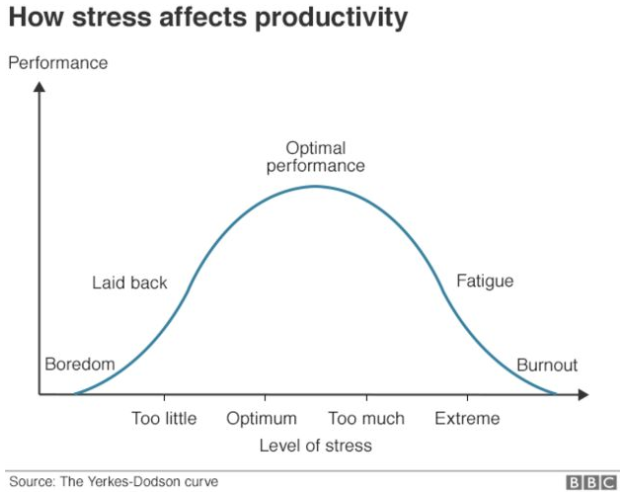
With huge amounts of workplace stress reported over 2019, it's important we learn to recognise when stress is becoming unhealthy and may lead to burnout.
Burnout is a state of emotional, physical, and mental exhaustion caused by excessive and prolonged stress. It occurs when you begin to feel overwhelmed and unable to meet constant demands. We take a look at how to prevent and reduce it.
What is burnout?
Earlier this year, the World Health Organisation officially recognised burnout as an occupational phenomenon. Their definition of Burnout is “a syndrome conceptualized as resulting from chronic workplace stress that has not been successfully managed.”
Stress or Burnout?
Stress isn't all bad - we know that for sure. Up to a certain point, stress helps to maximise our performance as seen on the graph below. However, once stress begins to surpass this area where optimal performance takes place, it begins to severely affect productivity and other aspects of our life.

Burnout can often be confused with stress, but they aren't the same. Stress should only occur over short periods of time and should disappear or reduce when the situation changes. Burnout is a state of emotional, physical, and mental exhaustion caused by excessive and prolonged stress.
It occurs when you begin to feel overwhelmed and unable to meet constant demands, leading to a loss of interest or passion for your work. For some, burnout is very similar to depression.
How to prevent burnout?
First, you need to identify the root cause of this prolonged stress. This could be a huge variety of things such as unfair treatment at work, an excessive workload or a lack of clarity about what your role involves. Dedicate some time to detailing these issues and finding areas that you can improve or change.
Some researchers have found that a key driver of burnout is being too hard on yourself and wanting it all, which begins to create overwhelming goals and then frustration. So, taking a step back and acknowledging your boundaries should help. Mostly, just giving yourself a break can make a big difference.
What to do if I'm experiencing burnout?
If any of this is sounding a bit too familiar, it may be possible that you’re burnt out or are at least on the way to being. Of course, speaking to a medical professional is advised if this is seriously affecting you but there are other simple things you can do to help the situation yourself.
A big part of managing stress is opening up to someone who is a good listener. They don’t have to be able to offer a solution but putting all of your feelings into words and talking through them can really help to reduce the burden.
Another idea is to reframe the way that you think about work, especially if you’re not in a position to change roles right now. This could be something as simple as trying to find value in your work, for example how you are helping others or even simple aspects you enjoy such as chatting with your coworkers.
Finally, revaluate your priorities. Obviously something in your life isn’t right, you may need to look at rebalancing areas of your life. For example: a more generous work-life balance, taking time away from technology, ensuring you sleep well or even doing something a bit more creative such as starting a new hobby.
